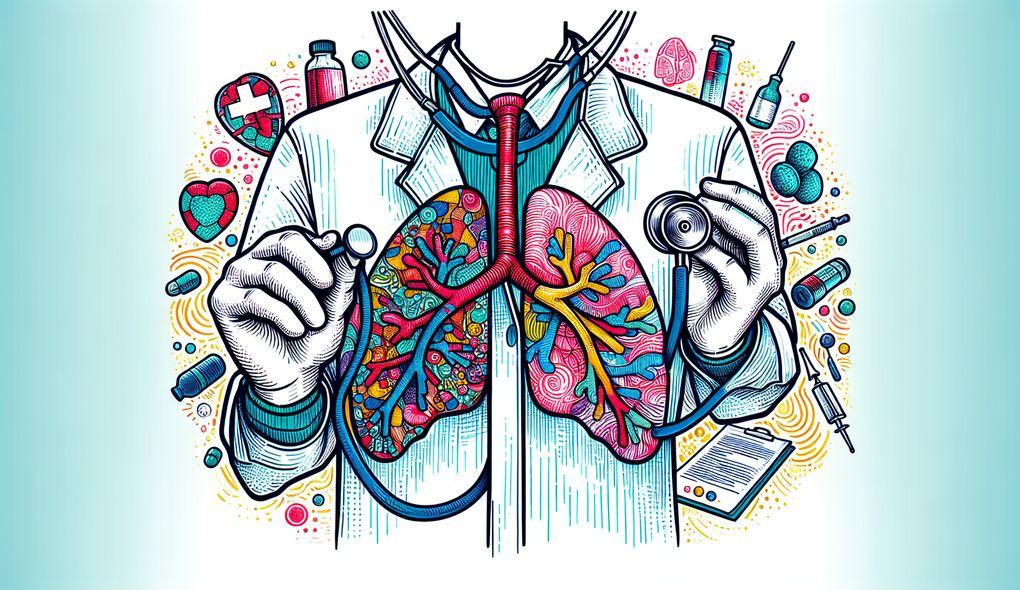How do you demonstrate strong clinical judgment and decision-making abilities?
SENIOR LEVEL

Sample answer to the question:
In my previous experience as a pulmonologist, I have consistently demonstrated strong clinical judgment and decision-making abilities. For example, when diagnosing respiratory diseases such as asthma, bronchitis, and pneumonia, I carefully evaluate the patient's symptoms, medical history, and results from diagnostic tests to make an accurate diagnosis. I then develop a comprehensive treatment plan tailored to the patient's needs and closely monitor their progress to ensure the treatment is effective. Additionally, I am constantly staying updated on the latest research and advancements in pulmonology to continually improve my decision-making abilities.
Here is a more solid answer:
As a pulmonologist, I have honed my clinical judgment and decision-making abilities through years of experience and continuous professional development. When faced with complex cases, I rely on my expert knowledge of respiratory diseases and treatments to accurately diagnose and develop effective treatment plans. For example, when a patient presented with challenging symptoms, I conducted a comprehensive evaluation, including performing and interpreting advanced pulmonary diagnostic tests such as pulmonary function tests and CT scans. Based on the results, I made an informed decision and promptly initiated appropriate treatment, resulting in positive patient outcomes. Additionally, I regularly engage in clinical studies and research to enhance my analytical skills and stay abreast of the latest advancements in pulmonology.
Why is this a more solid answer?
The solid answer provides specific examples and details that demonstrate the candidate's strong clinical judgment and decision-making abilities. It addresses all the evaluation areas and provides evidence to support their claims. However, it could still be improved by including more information about their leadership skills, collaboration abilities, and familiarity with EMR systems and healthcare IT.
An example of a exceptional answer:
My approach to demonstrating strong clinical judgment and decision-making abilities as a pulmonologist is multifaceted. First and foremost, my expert knowledge of respiratory diseases and treatments allows me to accurately diagnose complex cases and devise customized treatment plans. For instance, when faced with a patient presenting with puzzling symptoms, I meticulously reviewed their medical history, performed comprehensive pulmonary diagnostic tests, and collaborated with a multidisciplinary team to analyze the findings. This involved interpreting sophisticated test results such as bronchoscopies and leveraging my research and analytical skills to make informed decisions. Moreover, my leadership skills have been instrumental in mentoring medical personnel, ensuring that our team maintains the highest standards of clinical judgment. Finally, my strong communication skills enable me to effectively interact with patients, their families, and healthcare colleagues, ensuring that they are well-informed and involved in the decision-making process. Additionally, my commitment to ongoing professional development and continuous medical education helps me stay updated on the latest research, therapeutic techniques, and advancements in pulmonology.
Why is this an exceptional answer?
The exceptional answer provides comprehensive and detailed examples that demonstrate the candidate's strong clinical judgment and decision-making abilities. It covers all the evaluation areas and includes specific instances of how the candidate's expertise, leadership, collaboration, communication, and commitment to professional development contribute to their clinical judgment. This comprehensive answer stands out as it provides a complete picture of the candidate's abilities and demonstrates their suitability for the role.
How to prepare for this question:
- Familiarize yourself with the latest research and advancements in pulmonology to stay updated and enhance your decision-making abilities.
- Reflect on your past experiences where your clinical judgment and decision-making abilities were tested, and prepare specific examples to showcase your skills.
- Highlight your proficiency in performing and interpreting pulmonary diagnostic tests, such as pulmonary function tests and bronchoscopies.
- Emphasize any leadership experience and mentoring of medical personnel to demonstrate your ability to provide clinical guidance.
- Craft your answers in a clear and concise manner, focusing on the evidence and outcomes of your clinical judgment and decision-making abilities.
- Practice active listening and effective communication skills to show how you can collaborate and interact with a multidisciplinary healthcare team, patients, and their families.
- Stay informed about electronic medical record (EMR) systems and healthcare IT, as these are increasingly important in clinical decision-making and patient care management.
What are interviewers evaluating with this question?
- Expert knowledge of respiratory diseases and treatments
- Proficiency in performing and interpreting pulmonary diagnostic tests
- Research and analytical skills for engaging in clinical studies
- Strong clinical judgment and decision-making abilities
- Leadership skills and experience in mentoring medical personnel
- Ability to collaborate effectively with a multidisciplinary healthcare team
- Strong communication skills for interacting with patients, families, and healthcare colleagues
- Commitment to ongoing professional development and medical education
- Management skills to oversee patient care and departmental responsibilities
- Familiarity with electronic medical record (EMR) systems and healthcare IT

